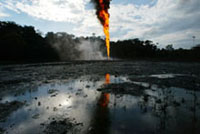 |
| Home |
| |
Analyses |
| |
Aid |
| |
| |
| |
News |
| |
| |
| |
| |
|
Last Updated:3/12/02 |
|
U.S.
Military and Police Aid
- Focus on Arauca and Putumayo:
Timeline of Current Events Putumayo: January 28, 2004 In an interview with Colombia's daily El Tiempo, Ecuadorian General Gustavo Tapia, Commander of the IV Military Zone in the Amazon region, stated that the border with Colombia "is a land without control." He also added that he would "take all the necessary steps to guarantee the territory does not spiral out of control." According to the General, a recent military raid in the bordering town of Puerto Nuevo in the Ecuadorian province of Sucumbíos seized 3.5 kg of coca paste, 14 pounds of coca and poppy, 26 weapons, and a series of catalogues, manuals, backpacks and military vests all bearing FARC insignia. [EL
Tiempo http://eltiempo.terra.com.co/coar/noticias/ARTICULO-WEB-_NOTA_INTERIOR-1494060.html] FARC rebels blew up the bridge that connects Putumayo with the department of Huila to the north. José Ricardo Burbano, director of Colombia's National Highway Institute (Invías), said the rebels blew up the bridge along the Caquetá River that connects Mocoa with the rest of the country and Ecuador. [El
Tiempo, http://eltiempo.terra.com.co/coar/noticias/ARTICULO-WEB-_NOTA_INTERIOR-1492359.html] While
on tour in Europe, the Vice President of the National Association
of Peasants (ANUC) Eder Jaír Sánchez, expressed
his concerns over the human rights situation in Colombia, lamenting
both the Colombian government's and the armed actors failure to
meet the UN High Commissioner for Human Rights' 27 recommendations
on human rights. ·
As
a result, the governor's office called for a Security Council
meeting with the mayor of Puerto Guzmán in order to evaluate
the situation and adopt security measures. Police Commander General Jorge Daniel Castro told the press that 3,400 policemen will be part of this program, which will focus on aerial fumigation. Additionally, he noted that three new companies -- made up of approximately 240 men -- will be added to the program throughout the year. Their goal will be to start fumigating areas where new coca cultivation is emerging. Castro
also said that the largest fumigation campaigns will be carried
out in Putumayo, Huila, Norte de Santander and Bolívar. January
4, 2003
Members
of the FARC's 48th front carried out eleven attacks on the Transandino
pipeline in the |
|
|
| Asia |
| |
Colombia |
| |
| |
Financial Flows |
| |
National Security |
| |
|
Center for
International Policy |
 will have created
five new companies in Putumayo. A flower
will have created
five new companies in Putumayo. A flower  company,
an agro-industrial center and a wood processing plant were inaugurated
in Villagarzón. Additionally, fruit-concentrate plants
were opened in Villagarzón and Orito
company,
an agro-industrial center and a wood processing plant were inaugurated
in Villagarzón. Additionally, fruit-concentrate plants
were opened in Villagarzón and Orito  At
the World Social Forum held in Bombay India, Ecuador's former
minister of the environment, Edgar Isch, said that the
fumigations are harming the health of people in the border areas
fumigated. He stated that the United States was harming the health
of Colombians and Ecuadorians by fumigating with chemical substances
to eradicate drug crops.[Neelesh
Misra, Associated Press]
At
the World Social Forum held in Bombay India, Ecuador's former
minister of the environment, Edgar Isch, said that the
fumigations are harming the health of people in the border areas
fumigated. He stated that the United States was harming the health
of Colombians and Ecuadorians by fumigating with chemical substances
to eradicate drug crops.[Neelesh
Misra, Associated Press] The
Colombian National Police announced a plan for massive coca eradication,
aiming to destroy 100,000 hectares of coca leaves and 4,000 hectares
of poppy seeds.
The
Colombian National Police announced a plan for massive coca eradication,
aiming to destroy 100,000 hectares of coca leaves and 4,000 hectares
of poppy seeds.  of the 27th Jungle Brigade. This brigade has replaced Putumayo's
24th Brigade. During the ceremony Colonel Londoño stated
his commitment to keeping the peace and maintaining order in Putumayo.
According to the new commander, there will be an increase in military
operations throughout the department to counter the insurgent
wave focused around Puerto Guzmán, San Miguel, Puerto Leguízamo
and Santiago.
of the 27th Jungle Brigade. This brigade has replaced Putumayo's
24th Brigade. During the ceremony Colonel Londoño stated
his commitment to keeping the peace and maintaining order in Putumayo.
According to the new commander, there will be an increase in military
operations throughout the department to counter the insurgent
wave focused around Puerto Guzmán, San Miguel, Puerto Leguízamo
and Santiago.  areas
of Puerto Colón and San Miguel. [Diario
del Sur, http://www.diariodelsur.com.co/enero/4/putumayo.php]
areas
of Puerto Colón and San Miguel. [Diario
del Sur, http://www.diariodelsur.com.co/enero/4/putumayo.php]